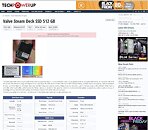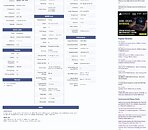- Joined
- Oct 9, 2007
- Messages
- 47,670 (7.43/day)
- Location
- Dublin, Ireland
| System Name | RBMK-1000 |
|---|---|
| Processor | AMD Ryzen 7 5700G |
| Motherboard | Gigabyte B550 AORUS Elite V2 |
| Cooling | DeepCool Gammax L240 V2 |
| Memory | 2x 16GB DDR4-3200 |
| Video Card(s) | Galax RTX 4070 Ti EX |
| Storage | Samsung 990 1TB |
| Display(s) | BenQ 1440p 60 Hz 27-inch |
| Case | Corsair Carbide 100R |
| Audio Device(s) | ASUS SupremeFX S1220A |
| Power Supply | Cooler Master MWE Gold 650W |
| Mouse | ASUS ROG Strix Impact |
| Keyboard | Gamdias Hermes E2 |
| Software | Windows 11 Pro |
We are announcing the latest addition to our PC enthusiast databases, the new TechPowerUp SSD Specs Database. Modeled along the lines of our immensely popular GPU Database, CPU Database, and hardware Reviews Database, the new SSD Specs Database, curated by Gabriel Ferraz, aims to be a definitive repository of information on solid-state drive (SSD) hardware specs, for all to freely access. Here, you'll find a growing collection of client SSD hardware specs across all relevant form-factors and information. The database also helps you identify multiple hardware revisions of the same SSD model, so you're aware of any bait-and-switch incidents, or vague specs by manufacturers.
The TechPowerUp SSD Specs Database has individual info pages on each capacity variant of an SSD model; besides any hardware variants it may have. You can have quick, actionable information on specs such as controller, NAND flash, DRAM cache, advanced NAND flash specs, interface, protocol, controller hardware specs, and known performance numbers from our testing. We are constantly adding new drives to this database, and you can help us grow, not just by suggesting improvements to the database itself, but for additions to the database, please reach out to the curator on the main page. But for now, enjoy what we've built for you!
TechPowerUp SSD Specs Database



View at TechPowerUp Main Site
The TechPowerUp SSD Specs Database has individual info pages on each capacity variant of an SSD model; besides any hardware variants it may have. You can have quick, actionable information on specs such as controller, NAND flash, DRAM cache, advanced NAND flash specs, interface, protocol, controller hardware specs, and known performance numbers from our testing. We are constantly adding new drives to this database, and you can help us grow, not just by suggesting improvements to the database itself, but for additions to the database, please reach out to the curator on the main page. But for now, enjoy what we've built for you!
TechPowerUp SSD Specs Database



View at TechPowerUp Main Site








